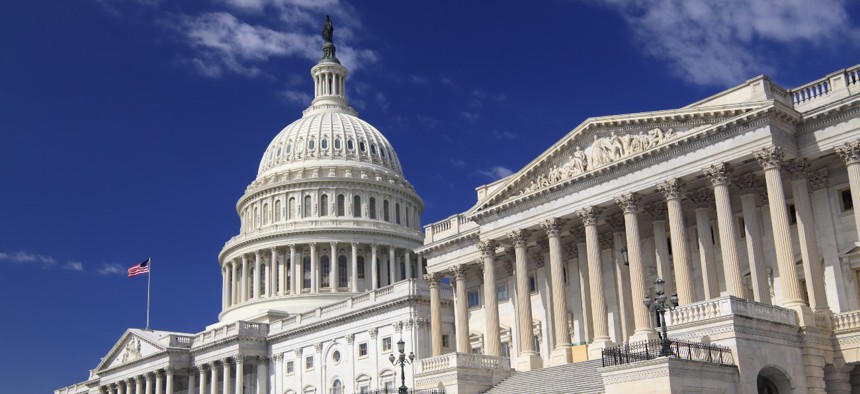
By Vlad G / Shutterstock.com
House Democrats Renew Calls for Bill Giving Election Agency More Funding and Responsibility
The “For the People Act” would bolster funding and responsibilities for the Election Assistance Commission.
Following news from intelligence officials on Wednesday evening of foreign election interference attempts, several House lawmakers are renewing their calls for the Senate to take up their massive reform bill that would bolster the funding and responsibilities of the nation’s elections clearinghouse.
Director of National Intelligence John Ratcliffe and FBI Director Christopher Wray gave an unexpected press briefing on Wednesday—13 days out from the election—in which they said that Iran and Russia obtained voter registration information in attempts to meddle in U.S. elections. They said that voting remains secure, but House lawmakers renewed the call for the Senate to take up their “2019 For the People Act,” which the chamber passed in March 2019 and has specific provisions to beef up the Election Assistance Commission.
Elections in the United States are run by states and localities, but the EAC—along with the FBI, Justice Department and Homeland Security Department—support them and have increasingly done so after the Russian election interference attempts in the 2016 cycle.
The bill “eliminates the existing funding cap, requires each state to comply with any EAC request for post-election survey results following any regularly scheduled general election for federal office beginning in November 2020, directs the [EAC] to assess the security, cybersecurity and effectiveness of the commission’s information technology systems and to review the effectiveness and efficiency of the state-based Help America Vote Act administrative complaint procedures,” according to a summary of the bill. It also, “establishes standards for election vendors based on cybersecurity and company ownership and expands the [EAC’s] ability to issue grants to harden our nation’s election infrastructure [and] directs the [EAC] to make available grants for states to replace voting machines that are not compliant [with] paper ballot voting systems and carry out voting system security improvements.”
The legislation also addresses campaign finance transparency, voting rights, redistricting and government ethics. Last October, Senate Majority Leader Mitch McConnell blocked a vote on the Senate’s companion version, to the dismay of House Democrats.
Rep. John Sarbanes, D-Md., who introduced the bill in January 2019, told Government Executive on Thursday that the House also passed the "Securing America’s Federal Elections Act” and the "Stopping Harmful Interference in Elections for a Lasting Democracy Act” which would “further protect our elections and safeguard our democracy.” He said he is “deeply alarmed that Majority Leader Mitch McConnell and Senate Republicans continue to block these critical national security efforts and repeatedly fail to protect our country from foreign attacks.”
Similarly, Rep. Zoe Lofgren, D-Calif., chairwoman of the House Administration Committee, which oversees the EAC, said in a statement on Wednesday night that the intelligence officials’ “announcement is deeply troubling, but entirely predictable.”
She called the Senate majority’s inaction on the legislation “a stark indictment of their failed legislative priorities,” despite the “repeated warnings from the Trump administration’s own top national security officials.”
McConnell’s office did not respond for comment on whether or not the senator is more inclined to take up the legislation now.
“We were absolutely aware” of these election threats, Benjamin Hovland, EAC chairman, told Government Executive on Thursday. “The intelligence community has been doing a good job to help keep election officials apprised of what they’re seeing and certainly that’s part of a change in how we have communication between federal, state and local partners” since 2016. He said the briefing on Wednesday night was a “reminder” that foreign adversaries are still looking to hinder confidence in U.S. elections, it’s important to seek information about elections from trusted sources and Americans need to engage in the process by voting.
While he couldn’t speak directly on pending legislation, he said, “we’ve consistently heard from election officials about the need for additional federal funds and, in particular, an annual or consistent funding stream that allows for some long-term planning [that] also recognizes the nature of cybersecurity threats, that they are an ongoing process.”







